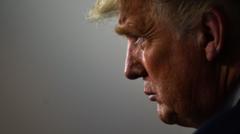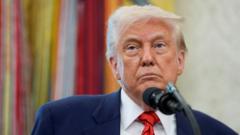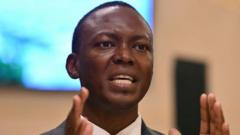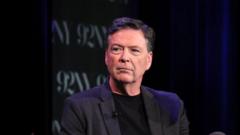Donald Trump’s upcoming second term promises radical reform, raising questions about the future of American democracy and societal norms.
Trump's Bold Vision for America: A Sweeping Second Presidential Act

Trump's Bold Vision for America: A Sweeping Second Presidential Act
As Donald Trump prepares for his inauguration, he signals ambitious changes ahead for the nation.
Inaugurated amidst frigid temperatures in Washington DC, Donald Trump is poised to launch a transformative second term, hoping to place his imprint on American history once again. In a unique ceremony nestled within the Capitol rotunda, Trump will transition from promises to action, launching a slew of executive orders aimed at significant reforms in areas including immigration, environmental policy, and LGBTQ+ rights. During a highly energetic rally on the eve of his inauguration, Trump teased a day filled with “fun” for his supporters, hinting at immediate changes upon taking office.
Many commentators are wondering what shape Trump's second act will take. The weight of skepticism from opponents paints a grim picture, with fears of autocratic governance and personality-driven policies overshadowing his presidency. His scorecard boasts a resounding electoral victory, yet his critics voice concerns over a potential oligarchical shift in American governance, with former President Joe Biden calling attention to influential billionaires allied with Trump.
This term, Trump intends to follow through on ambitious goals with a more competent and loyal cabinet than before. Speculations suggest he may implement widespread dismissals within government ranks, supported by tech magnate Elon Musk’s new initiative aimed at enhancing bureaucratic efficiency. Trump's fixation on a supposed “deep state” lurking in federal structures suggests an unprecedented purge of civil service roles, creating the risk of a hyper-political environment.
While major legislative measures like tax cuts for the wealthy necessitate congressional approval, Trump's grip on the Republican Party minimizes dissent, hinting at smooth passage of his proposals. The Democratic Party, still grappling with the ramifications of recent defeats, appears significantly disorganized, raising doubts about its ability to effectively counter Trump's policies.
Social media narratives could shift faster for Trump this term, thanks to previous backlash, with significant tech leaders already signaling a softened stance toward him. High-profile figures from the tech industry, including Musk, Bezos, and Zuckerberg, appear poised to support Trump’s agenda, further consolidating the relationship between politics and affluent power players.
Anticipation mounts around Trump's day-one rollouts, with expectations of potential pardons for Capitol riot participants. Yet, the complexities of his policies may clash with the desires of disillusioned supporters, particularly regarding economic reforms and labor implications stemming from proposed mass deportations.
In an administration defined by theatrical politics, Trump remains a captivating figure, with a commitment to transforming America through both eye-catching proposals and foundational shifts. While his effects may resonate globally, the key challenge will be whether his high-stakes entertainment can translate into genuine progress beneficial to the populace at large.
To stay updated on the developments of Trump's presidency and its implications, follow our political analysis segments that delve deeper into this evolving narrative.
Many commentators are wondering what shape Trump's second act will take. The weight of skepticism from opponents paints a grim picture, with fears of autocratic governance and personality-driven policies overshadowing his presidency. His scorecard boasts a resounding electoral victory, yet his critics voice concerns over a potential oligarchical shift in American governance, with former President Joe Biden calling attention to influential billionaires allied with Trump.
This term, Trump intends to follow through on ambitious goals with a more competent and loyal cabinet than before. Speculations suggest he may implement widespread dismissals within government ranks, supported by tech magnate Elon Musk’s new initiative aimed at enhancing bureaucratic efficiency. Trump's fixation on a supposed “deep state” lurking in federal structures suggests an unprecedented purge of civil service roles, creating the risk of a hyper-political environment.
While major legislative measures like tax cuts for the wealthy necessitate congressional approval, Trump's grip on the Republican Party minimizes dissent, hinting at smooth passage of his proposals. The Democratic Party, still grappling with the ramifications of recent defeats, appears significantly disorganized, raising doubts about its ability to effectively counter Trump's policies.
Social media narratives could shift faster for Trump this term, thanks to previous backlash, with significant tech leaders already signaling a softened stance toward him. High-profile figures from the tech industry, including Musk, Bezos, and Zuckerberg, appear poised to support Trump’s agenda, further consolidating the relationship between politics and affluent power players.
Anticipation mounts around Trump's day-one rollouts, with expectations of potential pardons for Capitol riot participants. Yet, the complexities of his policies may clash with the desires of disillusioned supporters, particularly regarding economic reforms and labor implications stemming from proposed mass deportations.
In an administration defined by theatrical politics, Trump remains a captivating figure, with a commitment to transforming America through both eye-catching proposals and foundational shifts. While his effects may resonate globally, the key challenge will be whether his high-stakes entertainment can translate into genuine progress beneficial to the populace at large.
To stay updated on the developments of Trump's presidency and its implications, follow our political analysis segments that delve deeper into this evolving narrative.




















